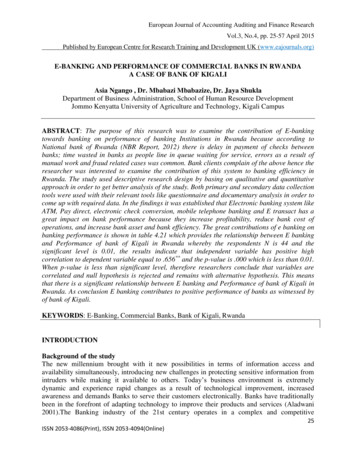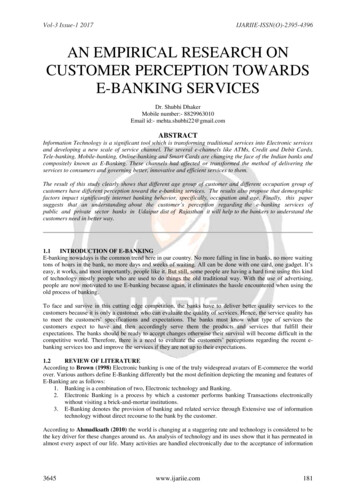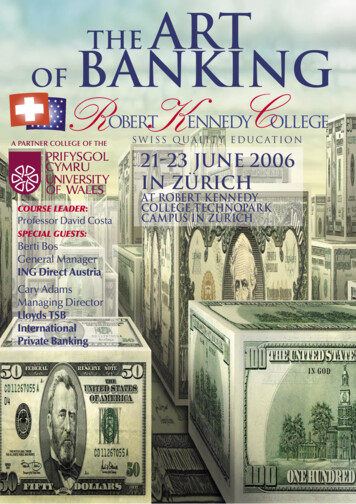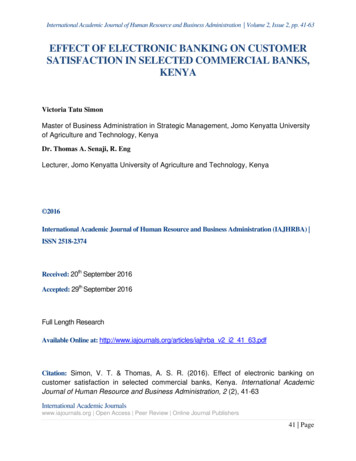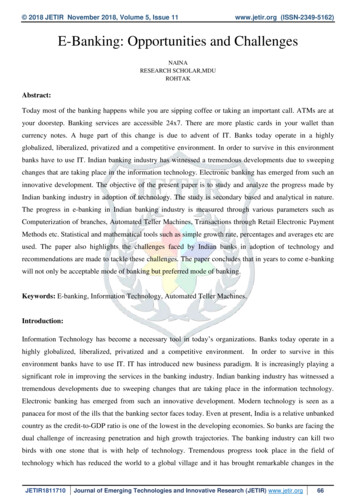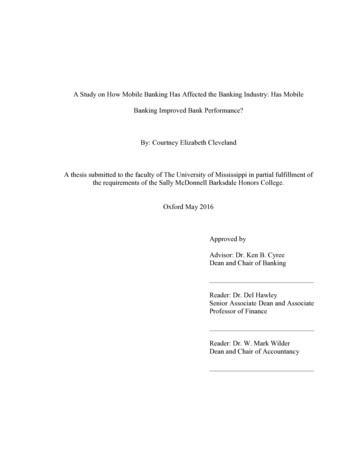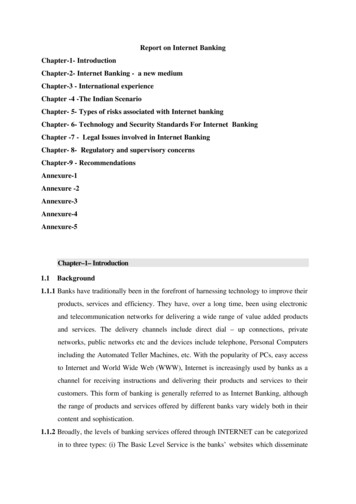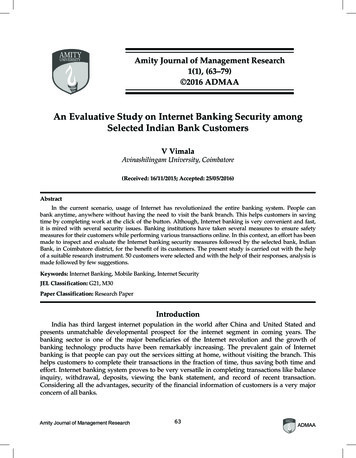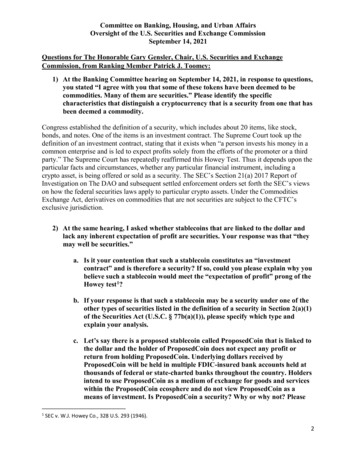
Transcription
Committee on Banking, Housing, and Urban AffairsOversight of the U.S. Securities and Exchange CommissionSeptember 14, 2021Questions for The Honorable Gary Gensler, Chair, U.S. Securities and ExchangeCommission, from Ranking Member Patrick J. Toomey:1) At the Banking Committee hearing on September 14, 2021, in response to questions,you stated “I agree with you that some of these tokens have been deemed to becommodities. Many of them are securities.” Please identify the specificcharacteristics that distinguish a cryptocurrency that is a security from one that hasbeen deemed a commodity.Congress established the definition of a security, which includes about 20 items, like stock,bonds, and notes. One of the items is an investment contract. The Supreme Court took up thedefinition of an investment contract, stating that it exists when “a person invests his money in acommon enterprise and is led to expect profits solely from the efforts of the promoter or a thirdparty.” The Supreme Court has repeatedly reaffirmed this Howey Test. Thus it depends upon theparticular facts and circumstances, whether any particular financial instrument, including acrypto asset, is being offered or sold as a security. The SEC’s Section 21(a) 2017 Report ofInvestigation on The DAO and subsequent settled enforcement orders set forth the SEC’s viewson how the federal securities laws apply to particular crypto assets. Under the CommoditiesExchange Act, derivatives on commodities that are not securities are subject to the CFTC’sexclusive jurisdiction.2) At the same hearing, I asked whether stablecoins that are linked to the dollar andlack any inherent expectation of profit are securities. Your response was that “theymay well be securities.”a. Is it your contention that such a stablecoin constitutes an “investmentcontract” and is therefore a security? If so, could you please explain why youbelieve such a stablecoin would meet the “expectation of profit” prong of theHowey test 1?b. If your response is that such a stablecoin may be a security under one of theother types of securities listed in the definition of a security in Section 2(a)(1)of the Securities Act (U.S.C. § 77b(a)(1)), please specify which type andexplain your analysis.c. Let’s say there is a proposed stablecoin called ProposedCoin that is linked tothe dollar and the holder of ProposedCoin does not expect any profit orreturn from holding ProposedCoin. Underlying dollars received byProposedCoin will be held in multiple FDIC-insured bank accounts held atthousands of federal or state-charted banks throughout the country. Holdersintend to use ProposedCoin as a medium of exchange for goods and serviceswithin the ProposedCoin ecosphere and do not view ProposedCoin as ameans of investment. Is ProposedCoin a security? Why or why not? Please1SEC v. W.J. Howey Co., 328 U.S. 293 (1946).2
Committee on Banking, Housing, and Urban AffairsOversight of the U.S. Securities and Exchange CommissionSeptember 14, 2021explain your analysis. Please do not address any potential effects ofProposedCoin on the banking system or systemic risk implications.d. If additional information is needed in order to determine whetherProposedCoin is a security, please specify what information is missing.The existing stablecoin market is worth nearly 138 billion and is embedded in crypto tradingand lending platforms. Though they represent only about 5 percent of all crypto assets, more than75 percent of trading on all crypto trading platforms occurred between a stablecoin and someother token.While I appreciate your inquiry regarding a particular hypothetical fact pattern, there are manyfacts that come into play when determining whether any particular financial instrument is or isnot a security. As the President’s Working Group report on stablecoins notes, “stablecoins, orcertain parts of stablecoin arrangements, may be securities, commodities and/or derivatives.”Thus, the use of stablecoins presents a number of public policy challenges with respect toprotecting investors.Stablecoins may facilitate those seeking to sidestep a host of public policy goals connected to ourtraditional banking and financial system, such as anti-money laundering, tax compliance,sanctions compliance, and other safeguards against illicit activity. We at the SEC will beworking with our sibling regulators, including the CFTC, to deploy the full protections of the lawto these products and arrangements where appropriate.3) At the September 14, 2021 hearing, you referenced that the SEC had previouslytaken the position, upheld in the courts, that the acquisition interests in whiskeycaskets were securities. In what ways are interests in whiskey caskets arecomparable to interests in stablecoins for purposes of analyzing whether a securityexists. For example, is each whiskey casket, and its contents, viewed asindistinguishable from other whiskey caskets? If not, would that analysis applycomparably to stablecoins within a particular cryptocurrency?Congress created a definition of security that is intended to be broad, in order to encompass newand different types of investments that are presented to investors and that invoke the protectionsof the federal securities laws. The definition of security includes “investment contract” amongthe list of other types of securities. Whether a particular instrument is within the definition ofsecurity is based on the facts and circumstances. As it relates to investment contracts, the U.S.Supreme Court’s Howey case and subsequent case law have found that an “investment contract”exists when there is the investment of money in a common enterprise with a reasonableexpectation of profits to be derived from the efforts of others.For example, in the late 1960s and early 1970s, the Commission published releases that warnedabout investment contracts that were sold in the form of whisky warehouse receipts. In thewhiskey warehouse scenario, the promoters sold receipts to finance the aging and blendingprocesses of Scotch whisky, where purchasers expected a return from the promoter’s efforts in3
Committee on Banking, Housing, and Urban AffairsOversight of the U.S. Securities and Exchange CommissionSeptember 14, 2021developing and selling the Scotch. These cases highlight the fact that whether something is asecurity or not will depend on the economic reality of the transaction or product, not on anyname or label given.4) Please list all no-action letters, arranged in chronological order, issued sinceJanuary 1, 2021 through the date of your response, that reference cryptocurrencies,tokens, digital assets, and similar items. Please also provide the number of pendingno-action letter requests that involve such items.All issued no-action letters are publicly available on the SEC’s website. A list of digital assetrelated staff no-action letters can be found at the SEC’s website at https://www.sec.gov/finhubunder the “Blockchain/Distributed Ledger” section and “Regulation, Registration, and RelatedMatters” drop-down tab. More specifically, there have been a number of SEC staff no-actionletters issued that relate to “cryptocurrencies, tokens [and] digital assets,” including staff lettersto TurnKey Jet, Inc., Pocketful of Quarters, Inc., Paxos Trust Company, LLC, and IMVU, Inc.Staff also issued a no-action letter to the Financial Industry Regulatory Authority (FINRA), andthe Commission published a no-action statement, relating to the custody of digital asset securitiesby special purpose broker-dealers. There have been no such no-action letters issued sinceJanuary 1, 2021.Pending no-action inquiries with the staff are non-public and in most cases are submitted to thestaff subject to claims of confidential treatment. As pending inquiries are not staff actions thatare public, I am unable to provide any information about them.5) Please list all exemptive orders, arranged in chronological order, issued sinceJanuary 1, 2021 through the date of your response, that reference cryptocurrencies,tokens, digital assets, and similar items. Please also provide the number of pendingapplications for exemptive orders that involve such items.The SEC has not issued any exemptive orders that reference cryptocurrencies, tokens, digitalassets, or similar items during the period between January 1, 2021 and November 23, 2021.Pending inquiries, including requests for exemptions from applicable provisions of the federalsecurities laws are, unless required to be submitted publicly, generally non-public and in mostcases submitted to the staff subject to claims of confidential treatment. I am unable to provideany information about pending applications for exemptive orders that are non-public. I am awareof one pending public request, which can be found 68/000095010321008030/dp151409 406b.htm.6) Please list all publicly-disclosed enforcement actions, arranged in chronologicalorder, taken since January 1, 2021 through the date of your response, that referencecryptocurrencies, tokens, digital assets, and similar items.4
Committee on Banking, Housing, and Urban AffairsOversight of the U.S. Securities and Exchange CommissionSeptember 14, 2021a. Which of these actions identify a specific cryptocurrency, token, or digitalasset that is a security?These are matters of public record, and there is a list of such actions, and the informationrequested on the SEC’s website at ementactions. The SEC’s complaints and orders in those actions are also a matter of public record andare available on the SEC’s homepage at the link above. The SEC’s complaints and orders inthose actions are also a matter of public record and are available on the SEC’s homepage at thelink above. The actions and trading suspensions filed since January 1, 2021 are listed below forconvenience.ActionsAction NameSEC v. GinsterDescriptionDate FiledThe Securities and Exchange Commission charged Ryan Ginster of Corona,California with conducting two unregistered and fraudulent securities offeringsthat raised over 3.6 million in cryptocurrency from retail investors.11/18/2021GTV MediaGroup, Inc., et al.The Securities and Exchange Commission charged New York City-based GTVMedia Group Inc. and Saraca Media Group Inc., and Phoenix, Arizona-basedVoice of Guo Media Inc., with conducting an illegal unregistered offering ofGTV common stock. The SEC also announced charges against GTV andSaraca for conducting an illegal unregistered offering of a digital asset securityreferred to as either G-Coins or G-Dollars. The respondents have agreed to paymore than 539 million to settle the SEC's action.9/13/2021SEC v. RivetzCorp., et al.The Securities and Exchange Commission charged Rivetz Corp., RivetzInternational SEZC, and Steven K. Sprague, the President of Rivetz and CEOof Rivetz International, with conducting an illegal, unregistered offering ofsecurities through an initial coin offering.9/8/2021SEC v.BitConnect, et al.SEC v. Brown, etal.The Securities and Exchange Commission filed an action against BitConnect,an online crypto lending platform, its founder Satish Kumbhani, and its topU.S. promoter and his affiliated company, alleging that they defrauded retailinvestors out of 2 billion through a global fraudulent and unregistered offeringof investments into a program involving digital assets. The Commissionpreviously charged five other individuals in a related action for promoting theBitConnect offering.9/1/2021Poloniex, LLCThe Securities and Exchange Commission filed settled charges againstPoloniex, LLC, under which Poloniex agreed to pay more than 10 million foroperating an unregistered online digital asset exchange in connection with itsoperation of a trading platform that facilitated buying and selling of digitalasset securities.8/9/2021Blockchain CreditPartners d/b/a DeFiMoney Market, etal.The Securities and Exchange Commission charged two Florida men and theirCayman Islands company for unregistered sales of more than 30 million ofsecurities using smart contracts and so-called “decentralized finance” (DeFi)technology, and for misleading investors concerning the operations andprofitability of their business DeFi Money Market.8/6/20215/28/20215
Committee on Banking, Housing, and Urban AffairsOversight of the U.S. Securities and Exchange CommissionSeptember 14, 2021Action NameDescriptionDate FiledSEC v. Uulala,Inc., et al.The Securities and Exchange Commission filed settled charges against Uulala,Inc., and two of its California-based founders, Oscar Garcia and MatthewLoughran for allegedly defrauding more than a thousand investors in anunregistered offering of digital asset securities that raised more than 9 millionand against Uulala and Garcia for allegedly engaging in a second fraudulentoffering of convertible notes.8/4/2021Blotics Ltd.,f/d/b/aCoinschedule Ltd.The Securities and Exchange Commission filed settled charges against theoperator of Coinschedule.com, a once-popular website that profiled offerings ofdigital asset securities. The SEC’s order finds that United Kingdom-basedBlotics Ltd. violated the anti-touting provisions of the federal securities laws byfailing to disclose the compensation it received from issuers of the digital assetsecurities it profiled.7/14/2021Loci, Inc., et al.The Securities and Exchange Commission filed settled charges against Loci,Inc. and its CEO John Wise for making materially false and misleadingstatements in connection with an unregistered offer and sale of digital assetsecurities. According to the SEC's order, Loci provided an intellectual propertysearch service for inventors and other users through its software platform calledInnVenn. The SEC's order finds that from August 2017 through January 2018,Loci and Wise raised 7.6 million from investors by offering and selling digitaltokens called "LOCIcoin." As stated in the order, in promoting the ICO, Lociand Wise made numerous materially false statements to investors and potentialinvestors, including false statements concerning the company's revenues,number of employees, and InnVenn's user base.6/22/2021SEC v. Hamid, etal.SEC v. Manor, etal.The Securities and Exchange Commission charged three individuals for theirroles in the 30 million initial coin offering fraud that was spearheaded byconvicted criminal Boaz Manor and his associate, Edith Pardo. The SECpreviously charged Manor, Pardo, and their companies, CG Blockchain, Inc.and BCT Inc. SEZC in connection with the scheme in January 2020.6/15/2021SEC v. Radjabli, etal.The Securities and Exchange Commission filed charges against Edgar M.Radjabli of Boca Raton, Florida, and two entities he controlled for engagingin several securities frauds of escalating size. The SEC's complaint alleges thatRadjabli, formerly a practicing dentist, and Apis Capital Management LLC, anunregistered investment adviser firm Radjabli owned and controlled, conducteda fraudulent offering of Apis Tokens, a digital asset representing tokenizedinterests in Apis Capital's main investment fund. The complaint further allegesthat Radjabli and Apis Capital manipulated the securities market for VeritoneInc., a publicly-traded artificial intelligence company, by announcing inDecember 2018 an unsolicited cash tender offer to purchase Veritone for 200million, when, in truth Radjabli and Apis Capital lacked the financing or anyreasonable prospect of obtaining the financing necessary to complete the deal.6/11/2021SEC v. LBRY, Inc.The Securities and Exchange Commission charged LBRY, Inc., a blockchaincompany, with conducting an unregistered offering of digital asset securities.According to the SEC's complaint, from at least July 2016 to February 2021,LBRY, which offers a video sharing application, sold digital asset securitiescalled "LBRY Credits" to numerous investors, including investors based in theUS. LBRY allegedly received more than 11 million in U.S. dollars, Bitcoin,and services from purchasers who participated in its offering.3/29/2021SEC v. CuttingThe Securities and Exchange Commission filed an emergency action andobtained a temporary restraining order and asset freeze against Shawn C.Cutting of Sandpoint, Idaho, for allegedly raising millions of dollars fromhundreds of investors by falsely claiming to be a financial adviser with3/5/20211/17/20206
Committee on Banking, Housing, and Urban AffairsOversight of the U.S. Securities and Exchange CommissionSeptember 14, 2021Action NameDescriptionDate Filedsecurities licenses, overstating investment returns, and misappropriating moneyreceived from investors.SEC v. Coinseed,Inc., et al.The Securities and Exchange Commission charged Coinseed, Inc., a companythat purported to offer a mobile investment application that enabled users toinvest in digital assets, and its co-founder and Chief Executive Officer,Delgerdalai Davaasambuu, in connection with Coinseed's offer and sale ofdigital asset securities.2/17/2021SEC v. Krstic, etal.The Securities and Exchange Commission charged three individuals withdefrauding hundreds of retail investors out of more than 11 million throughtwo fraudulent and unregistered digital asset securities offerings.2/1/2021Wireline, Inc.The Securities and Exchange Commission filed a settled cease-and-desistproceeding against financial technology company Wireline, Inc. for makingmaterially false and misleading statements in connection with an unregisteredoffer and sale of digital asset securities.1/15/2021AmericanCryptoFed DAOLLCThe Commission instituted proceedings against American CryptoFed DAOLLC, a Wyoming-based organizationconcerning the registration of thecompany’s securities.11/10/2021Long BlockchainCorp.The Commission revoked registration of the securities of Long BlockchainCorp., a beverage business that had announced a shift to become a blockchaintechnology business which never became operational, for failure to filequarterly and annual reports.2/22/20217) Please list all guidance materials posted to sec.gov or investor.gov since January 1,2021 through the date of your response that reference cryptocurrencies, tokens,digital assets, and similar items. You may omit any items listed in response to theprior three questions.Statements and other materials relating to digital assets are available to the public from ourwebsite homepage on the sec.gov and investor.gov websites. Click through: SEC.gov StrategicHub for Innovation and Financial Technology (FinHub); Spotlight on Initial Coin Offerings andDigital Assets Investor.govStatements since January 1, 2021 include:Risk Alert: The Division of Examinations’ Continued Focus on Digital Asset Securities.Staff Statement on Funds Registered Under the Investment Company Act Investing in theBitcoin Futures Market.Funds Trading in Bitcoin Futures – Investor Bulletin.Digital Asset and “Crypto” Investment Scams – Investor Alert.7
Committee on Banking, Housing, and Urban AffairsOversight of the U.S. Securities and Exchange CommissionSeptember 14, 2021President’s Working Group on Financial Markets, the Federal Deposit Insurance Corporation,and the Office of the Comptroller of the Currency Report on Stablecoins.Statement by Chair Gary Gensler on President’s Working Group Report on Stablecoins.8) You recently stated in an August 5, 2021 letter to Senator Warren that the publicwould benefit from “additional [Congressional] authority to write rules for andattach guardrails to crypto trading and lending.” Do you believe the SEC needsadditional Congressional authority to properly regulate the digital assetmarketplace?I have stated before that I believe we need additional authorities to prevent crypto asset-relatedtransactions, products, and platforms from falling between regulatory cracks.Additional SEC regulatory authority over crypto trading and lending platforms andintermediaries could aid the SEC’s ability to prevent fraud and abuse and promote investor andmarket protection. I have asked SEC staff, working with our fellow regulators, to work alongtwo tracks. First, I have asked them how we can work with other regulators under our currentauthorities to best bring investor protection to these markets. Second, I’ve asked them what gapswe might need Congress’s assistance to fill.9) I want to learn more about your thoughts on the threshold for a token to be deemeddecentralized. In a 2018 New York Times article, you spoke about thedecentralization of Ethereum (ETH). As the article lays out, “Mr. Gensler saidEther could have more problems because the first Ether tokens were sold in 2014,before the network was functional, by the Ethereum Foundation. Ether could get offthe hook, Mr. Gensler said, because its development has been more decentralizedrecently, and new Ether tokens are now given out to so-called miners through anetwork.” 2 Meanwhile, you have also repeatedly said that you agree with formerSEC Chair Clayton’s statement that he has yet to see an initial coin offering thatwas not a security.a. I highlight these two instances because to me it appears that you believe ETHtransitioned from a security to a commodity. The concept that ETH cantransition to a commodity because “its development has been moredecentralized” appears to conflict with your past statements that all ICOtokens are securities. I understand there are pending court cases that mayaddress this very issue, but as we await decisions in these cases, can youclarify your position as to when a token is sufficiently decentralized in lightof your previous hnology/gensler-mit-blockchain.html8
Committee on Banking, Housing, and Urban AffairsOversight of the U.S. Securities and Exchange CommissionSeptember 14, 2021Though I am unable to comment about any particular crypto asset or project, I find myselfgenerally agreeing with former SEC Chairman Jay Clayton when he testified in 2018: “To theextent that digital assets like [initial coin offerings, or ICOs] are securities — and I believe everyICO I have seen is a security — we have jurisdiction, and our federal securities laws apply.”Purchasers of ICO tokens generally are buying these tokens anticipating profits, and there’s asmall group of entrepreneurs and technologists standing up and nurturing the projects. I believewe have a crypto market now where many tokens may be unregistered securities, withoutrequired disclosures or market oversight.The U.S. Supreme Court’s Howey case and subsequent case law have found that an “investmentcontract” exists when there is the investment of money in a common enterprise with a reasonableexpectation of profits to be derived from the efforts of others.10) I understand from your previous remarks that a Bitcoin exchange-traded fund(ETF) approval is unlikely to occur soon given your concerns around marketstructure and volatility. However, even with these concerns being voiced publiclyover 20 companies have applied to launch a Bitcoin ETF due to the strong amountof interest cited by U.S. institutions. We have seen regulatory bodies in Canada,Germany, Switzerland and Sweden approve bitcoin ETPs, and many U.S. investorsare finding ways to access these products in lieu of the absence of an SEC-approveddomestic product.a. What are your views on other international regulators approving thesebitcoin ETPs?Various international jurisdictions have different legal standards and processes for considerationof new investment products, including proposed exchange-traded products that may be based onbitcoin. Our staff continues to monitor developments in other jurisdictions with respect tobitcoin-focused investment vehicles and has engaged with fellow international regulators on theirapproaches to potential bitcoin-based investment vehicles and ongoing monitoring of suchvehicles if they exist. As fellow regulators, our staff seeks to learn from the experiences ofothers. However, actions in the other jurisdictions are not binding on U.S. regulators, and ourstaff continues to follow applicable legal standards and processes under the federal securitieslaws when considering bitcoin-focused investment products.b. Is there a role Congress can play in hopes of making bitcoin ETPs (includingan ETF) happen here in the United States?I welcome Congress’ interest and input on the prospect of bitcoin ETPs. As noted above, ourstaff continues to follow applicable legal standards and processes under the federal securitieslaws when considering bitcoin-focused investment products. That being said, the markets foractual bitcoin itself today are largely unregulated. This lack of regulatory oversight and9
Committee on Banking, Housing, and Urban AffairsOversight of the U.S. Securities and Exchange CommissionSeptember 14, 2021surveillance leads to concerns about the potential for fraud and manipulation. Congress couldbring the bitcoin markets under the U.S. regulatory umbrella, which could be helpful in ourconsideration of bitcoin ETPs.11) You stated in a recent speech that you look forward to reviewing filings of ETFsregistered under the Investment Company Act, adding that you look forward to thefilings “particularly if those are limited to these CME-traded Bitcoin futures.” 3 Canyou please explain why you look forward to evaluating CME-traded Bitcoin futuresbut do not express the same enthusiasm for approving a Bitcoin spot exchangetraded product (ETPs), particularly when they both are based upon the sameunderlying spot Bitcoin markets? Please also explain whether your views also applyto the submission of proposed listing rule changes for national securities exchangesregarding Bitcoin-related ETPs and ETFs.The first of the bitcoin futures ETFs have gone effective and are operating. The Commissionconsiders all exchange-trading products under the standards applicable to them.12) In December 2020, the SEC put out a statement and request for comment regardingthe custody of digital asset securities by special purpose broker-dealers (SPBDs).The statement requires the SPBD to limit its business to “dealing in, effectingtransactions in, maintaining custody of, and/or operating an ATS [alternativetrading system] for digital asset securities.” 4 Several submitted comments havenoted that requiring a broker-dealer to bifurcate its operations to be able to dealseparately with digital asset securities is unnecessary and could lead to additionaloperational risk for the broker-dealer, among other challenges. Is the SECconsidering revisions to its statement to remove the requirement to bifurcate abroker-dealer’s operations for the purposes of acting as a custodian of digital assetsecurities?In the December 2020 statement, the Commission expressed certain concerns regarding thecustody of crypto asset securities and the potential ramifications that would result from the lossor theft of crypto asset securities. The period in which the statement and request for comment isin effect will provide the Commission and its staff an opportunity to gain additional insight intothe evolving standards and best practices with respect to custody of crypto asset securities.During this five-year period, the Commission will continue to evaluate its position on an ongoingbasis and will consider comments to inform any future rulemaking or other Commission actionin this area.13) Recent press articles have discussed high fees being charged to public companies inconnection with distribution of proxy materials. Historically, these have been setaccording to a fee schedule adopted by the New York Stock Exchange w.sec.gov/rules/policy/2020/34-90788.pdf10
Committee on Banking, Housing, and Urban AffairsOversight of the U.S. Securities and Exchange CommissionSeptember 14, 2021Earlier this year, the SEC rejected a proposed rule change by NYSE to cease settinga fee schedule.a. What steps are being taken to lower these costs, particularly as more proxymaterials are being distributed electronically?b. Some service providers who fulfill brokers’ obligations to distribute proxymaterials impose an additional “suppression fee,” which results in the serviceprovider receiving a higher fee for electronic distributions than for papermailings. Please explain whether charging higher fees for electronicdistributions is in the best interests of investors.Thank you for your interest in NYSE’s schedule of proxy distribution fees. I agree that thesefees present important issues. An NYSE petition for Commission review of staff’s disapproval ofan NYSE proposal to remove the fee schedule from its rules is before the Commission. I’mlooking forward to learning more about these issues and appreciate your engagement.14) I have previously suggested to the SEC that it make permanent the relief it grantedfor allowing virtual meetings, rather than in-person, for investment companyboards under the Investment Company Act. Please discuss whether you intend toadd this project to the SEC’s next regulatory agenda.The Investment Company Act requires certain board votes to be cast in person. The Commissionhas at times granted temporary industry-wide relief from this requirement in response to variousnational emergencies, including the COVID-19 pandemic. The Commission’s exemptiveauthority depends on, among other things, the exemption being consistent with the purposesintended by the provisions of the Investment Company Act. The Commission could considerapplications for in-person voting relief for appropriate situations beyond emergencies, as itsexemptive authority permits.15) The Consolidated Appropriations Act, 2021, Public Law No. 116-260, instructed theSEC to deliver two reports about small issuers by June 2021 – one on analystresearch 5 and one about the effects of the 10% limitation on investments byinvestment companies. 6 These reports are now overdue. What is the estimatedtimeframe for delivery of these reports?SEC st
The Securities and Exchange Commission charged two Florida men and their Cayman Islands company for unregistered sales of more than 30 million of securities using smart contracts and so-called "decentralized finance" (DeFi) technology, and for misleading investors concerning the operations and profitability of their business DeFi Money Market.
